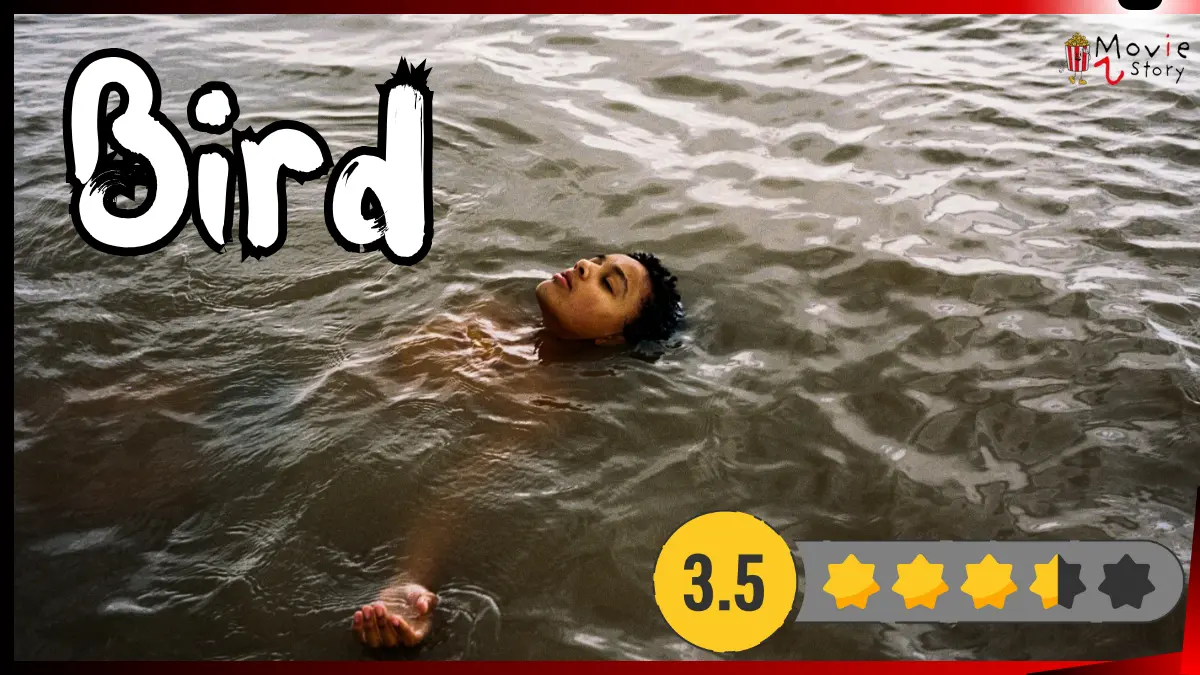Bird Movie Review: Andrea Arnold’s Bird (2024) is a testament to her reputation as a director known for gritty, often unforgiving depictions of working-class life. Known for her films American Honey and Fish Tank, Arnold has built a career exploring the lives of individuals struggling in harsh environments, capturing their raw emotions against real-world backdrops. Bird takes a distinctive approach in her filmography by blending social realism with hints of magical realism, a move that creates a unique cinematic experience. This film centers on 12-year-old Bailey, whose life with her tattooed and unpredictable father, Bug, reflects the hardships and turbulence of their surroundings in working-class Kent. Arnold pushes into new territory, aiming to infuse Bailey’s coming-of-age journey with a sense of wonder, danger, and longing through a mystical figure known only as “Bird.”
Bird Movie Review
Set in the heart of a struggling Kent neighborhood, Bird explores the life of young Bailey, whose formative years are shaped by both family instability and the grittiness of her environment. Her father, Bug, played by Barry Keoghan, is a rough, unreliable parental figure, marked by his own youthful recklessness—he fathered Bailey at just 14. The film opens with Bug zooming through impoverished streets on an electric scooter with Bailey, painting a vivid picture of her rough-and-tumble lifestyle. Bailey lives in a ramshackle home with Bug and her half-brother Hunter, who is slightly older and already involved in a gang that takes vigilante justice into their own hands. This chaotic life is punctuated by sporadic moments of humor, which, while often dark, serve to lighten the bleakness of their reality. Bailey’s mother, meanwhile, lives with her new partner, leaving Bailey yearning for stability and belonging in a life that seems persistently unsteady.
Amidst the hardship and instability, Bailey encounters a strange, quiet figure who calls himself Bird, portrayed by Franz Rogowski. Appearing one morning in a field, Bird stands as a beacon of safety and hope for Bailey, bringing a sense of calm to her otherwise tumultuous world. He’s not only gentle and reserved but also intriguing—a stark contrast to the loud, chaotic figures around Bailey. As they form a friendship, Bird becomes a confidant and mentor of sorts, his peaceful presence encouraging Bailey to dream of a life beyond her daily struggles. Her relationship with Bird fills her with a unique sense of security, something she rarely experiences otherwise. Bird’s mysterious, almost supernatural nature enhances his allure, making him seem like an otherworldly figure who both fascinates and soothes Bailey as she navigates the complexities of her family, her friends, and her budding adolescence.
While Arnold’s films are usually rooted firmly in social realism, Bird introduces magical realism in a way that feels both experimental and risky for the filmmaker. Bird, with his enigmatic aura, brings a surreal quality that starkly contrasts with the film’s portrayal of gritty reality. Through Bailey’s eyes, Bird isn’t merely a person; he embodies her inner desire for protection and her search for meaning in an unstructured world. Arnold’s decision to introduce a character like Bird, who feels half-real and half-imagined, gives the film a fairy-tale quality that disrupts its otherwise realistic setting. This blend of real and surreal draws viewers into Bailey’s perspective, allowing them to see her longing for a life of security and companionship. Some critics see this blending of styles as a welcome change for Arnold, but others feel it detracts from the authenticity that characterizes her previous films, making Bird feel less grounded than her other works.
In a cast filled with memorable performances, Nykiya Adams shines as Bailey, anchoring the film with her emotional depth and nuanced portrayal of a young girl caught between anger and hope. Adams brings a raw sensitivity to Bailey, making her struggles feel palpably real. Barry Keoghan, known for his intense screen presence, delivers a powerful yet erratic performance as Bug. Covered in tattoos and often shirtless, Bug embodies a mix of youthful recklessness and vague parental affection. Although he’s far from the ideal father, he genuinely tries to connect with Bailey and Hunter in his own, unconventional ways. Yet, some reviewers suggest that Bug’s character feels more like a caricature than a fully fleshed-out person, with his eccentricities sometimes overshadowing the character’s depth. On the other hand, Franz Rogowski’s Bird exudes a delicate and mysterious charm, his subtle mannerisms adding an ethereal quality that mirrors Bailey’s yearning for a different life. Together, these performances create a complex web of interactions that reveal the nuances of a family trying to find stability amid chaos.
Bird is rich with symbolism, particularly through its recurring imagery of animals and transformation. Arnold uses creatures like toads, caterpillars, and birds to reflect Bailey’s internal journey and the wild, unstructured nature of her life. Bug’s idea of selling hallucinogenic toad slime, while absurd, underscores his perpetual pursuit of quick fixes, contrasting sharply with Bailey’s quest for genuine change. The film’s cinematography, crafted by Robbie Ryan, emphasizes the natural world surrounding Bailey’s gritty reality. From scenes of abandoned fields to the insect-laden walls of Bailey’s home, the visuals underscore themes of transformation, resilience, and the constant push and pull between freedom and constraint. Ryan’s camera captures these details with a careful balance, enhancing the film’s atmosphere and grounding its more surreal elements within a tangible, recognizable world.
Critics are divided in their reception of Bird, with some applauding Arnold’s departure from pure social realism and others feeling that the film struggles to balance its themes. While the magical realism adds a fresh layer to the storytelling, it also dilutes the grittiness Arnold is known for, leading some to question whether this film truly captures the emotional weight of her best works. For those who appreciate her previous films’ raw and unfiltered approach, Bird might feel too fanciful, lacking the shock and emotional impact of films like Fish Tank or American Honey. Others, however, find the film’s blend of realism and fantasy a refreshing evolution, showcasing Arnold’s willingness to push her creative boundaries, even if the result feels uneven at times.
Conclusion
In Bird, Andrea Arnold ventures into new territory, mixing magical realism with the harsh realities of working-class life to explore themes of hope, family, and resilience. While the film may not fully capture the emotional depth of her earlier works, it remains a testament to Arnold’s ability to tell stories about people navigating broken systems and imperfect lives. For Bailey, Bird represents more than a friend—he’s a beacon of hope and a symbol of the security she desperately craves. By the end, Bird feels like a heartfelt fable, less about escaping reality and more about finding peace within it. Though Arnold’s latest work may not leave as lasting an impact as her previous films, it offers a unique, tender perspective on the fragility of human connections and the beauty of finding solace in the most unlikely places.
Top 5 Rotten Tomatoes Reviews
It’s more sentimental than what we’re accustomed to from Arnold and her previous films, “American Honey,” “Fish Tank” and the acclaimed documentary, “Cow.” But her unexpected shift into magical realism works, if you maintain an open mind – Al Alexander, Movies Thru the Spectrum
There’s value to holding onto that child’s-eye view, and Bird, more than anything, is an ode to that fact – Alison Willmore, New York Magazine/Vulture
The ideas keep on coming, but this difficult, disjointed feature never quite finds its groove. The social realism works; the misplaced fantasy angle doesn’t – Chris Wasser, Sunday Independent (Ireland)
Fish Tank director Andrea Arnold returns to kitchen sink realism – and finds freedom and joy over darkness – Christina Newland, iNews.co.uk
With moving sequences benefiting from emotionally cutting song choices, Bird evolves into something more touching, with Andrea Arnold always reserving judgment and maintaining empathy for the lives these young people lead – Robert Kojder, Flickering Myth
Top Movie Ratings
| Imdb | 7.2/10 |
| Rotten Tomatoes | 82% |
| Metacritic | 72% |
Latest Release Movie:


